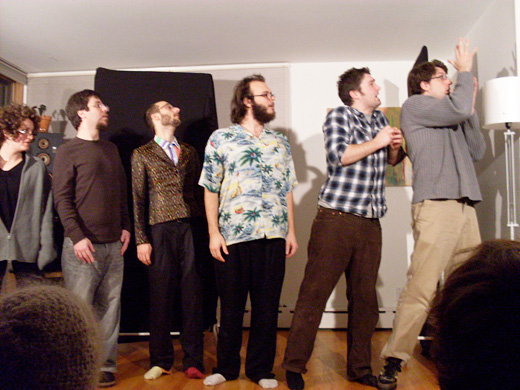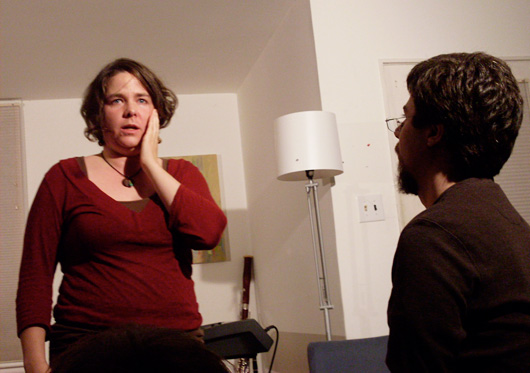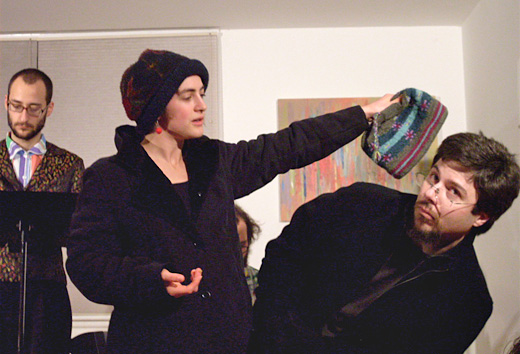The Truth About Injustice Always Sounds Outrageous
During my undergraduate and graduate studies in music, I took an experimental composition seminar with Herbert Brün. Later, Herbert and others grew that seminar into a school of its own, called the School for Designing a Society. Years later, in 2009, I once again took the experimental composition seminar, this time led by Susan Parenti and Mark Enslin. In comparison to the original, the new seminar and the school had a broader approach with a strong and developed emphasis on activism.

Scene from Hullabatoo, by Susan Parenti
2009Pictured from left to right: Carly Nix, Ben Grosser, Andrew Heathwaite, Jacob Barton, Ben Michaelis, Philip Schuessler
The Killing of Kiwane Carrington
That same time period saw a tragedy happen in Champaign with the killing of an unarmed 15 year-old black child by a white Champaign police officer. In reaction, many members of the seminar were active in dialog with the city, pushing for punishment of the officer in question, as well as the police chief (who was one of the two officers on the scene).
While we were preparing to present our experimental theater, music, and movement in a House Theater in December 2009, the city’s investigation of the incident ended with absolution of the officers involved, saying they did nothing wrong. Phrases in the report such as “the gun went off” were used to describe how the officer shot and killed Kiwane Carrington. The group struggled to find a way to make our already-planned performances relevant within this context.
Experimental Theater as Response

Scene from 'Lullabies' by Elizabeth Simpson
Elizabeth Simpson (left), Ben Grosser (right)
Our solution was to compose new works about the shooting and investigation that functioned as connective tissue between the experimental music pieces. To help bring the works into the new context, “letters to the editor” were composed and performed in the style of the experimental music that surrounded them. The program was titled “The Truth About Injustice Always Sounds Outrageous,” and was presented in Urbana, IL on Dec. 8-10, 2009. Approximately 100 people attended over the three nights. The audience reported that the interweaving of the experimental art works with art pieces about the killing helped them to hear both kinds of works differently. The “letters” informed their understanding of the music, while the music informed their understanding of the “letters.”
Uninduced Approximation
I performed my work Uninduced Approximation for low trumpet and tape, and followed it with a “letter” in the same style. The letter discussed the absurdity of shooting an unarmed child. The trumpet and tape work presents itself as a dialog between the trumpet and tape. The letter mimicked this pattern. It was performed by two individuals who spoke the dialog with timbres and rhythmic styles similar to the music.
What the $#@! was that??

Scene from "What the $#@! Was That??"
Terra Glick (left foreground), Ben Grosser (right)
I also wrote a short dialog called “What the $#@! was that??” which was designed to follow a piece of new music, exploring the question of how much a piece of art should explain itself. Should art make itself comprehensible?
Program
The event was put on by a large group of outstanding artists and musicians. Here is the full program for the night:
Part I
- Gestural Collider, by Benjamin Michaelis
- Letter to the Editor, by Cast
- Trice, by Mark Enslin, text by Indigo Frank
- What the $#@! Was That?, by Ben Grosser
- Commodity Exchange, by David Friedman
- Letter to the Editor, by Mark Enslin
- Uninduced Approximation, by Ben Grosser
- Letter to the Editor, by Ben Grosser and Mark Enslin
- Smell, by Danielle Chynoweth
- The Tyranny of Structureless, by Kat Lieder
- Bird Cow, by Lou and Peter Berryman
- Letter to the Editor, by Carly Nix, Ben Grosser, elizaBeth Simpson
- Hullabatoo, by Susan Parenti
Part II
- No More War, by Frederick Rzewski
- Letter to the Editor, by Andrew Heathwaite
- Cans I, by Terra Glick and Ben Michaelis
- Idea and Idol, by Michael Gairanos
- Music that Fits My Mood, by Rick Burkhardt
- Glass Abattoir, by Philip Schuessler
- Cans II, by Terra Glick and Ben Michaelis
- Lullabies, by Elizabeth Simpson
- De-quinin’, by Jacob Barton
- Cans III, by Terra Glick and Ben Michaelis
- Is What You See What You See?, by Andrew Heathwaite, text by Michael Gairanos
Cast
- Jacob Barton
- Mark Enslin
- Michael Gairanos
- Terra Glick
- Ben Grosser
- Andrew Heathwaite
- Kat Lider
- Ben Michaelis
- Carly Nix
- Susan Parenti
- Philip Schuessler
- Elizabeth Simpson